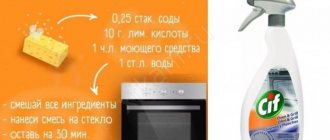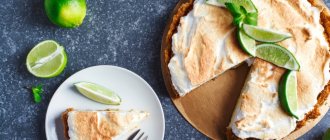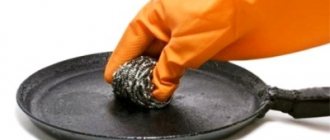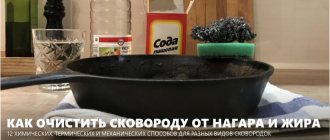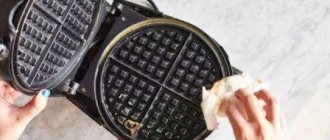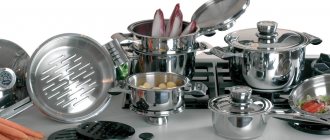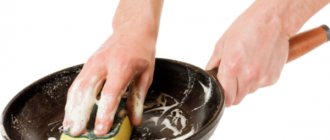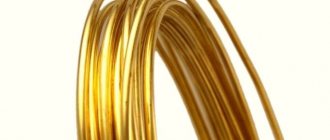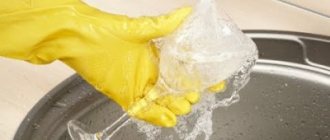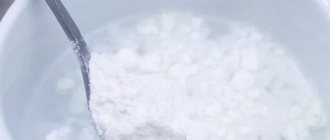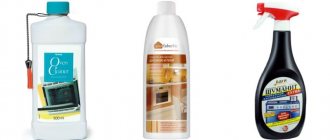Aluminum kitchenware is not afraid to remove dirt using fine powders and hard metal brushes. All of the following applies to aluminum baking sheets. How to quickly clean the surface of burnt fat:
- remove remnants of prepared dishes;
- soak the baking sheet in hot water with added dishwashing liquid;
- rinse with water;
- pour soda or salt onto the bottom and rub with a sponge;
- If you cannot remove carbon deposits, then use a wire brush.
You can expect a positive result if the contamination is not old.
Processing aluminum with soda and mustard
How to clean a baking tray from old fat? In many cases, only baking soda and mustard powder help with greasy dishes. At home, you can wash baking trays with these products:
Cleansing with baking soda and salt
Folk remedies that can be used to combat contaminated surfaces are baking soda and salt. To do this you need:
Removing fat by digestion
If the baking sheets are heavily contaminated with fat, you can use boiling. When a woman washes surfaces in this way, it is worth considering some subtleties:
- Place the baking sheet in a large container;
- pour water to completely cover the surface to be cleaned;
- add two tablespoons of dishwashing liquid and soda;
- boil the dishes for half an hour;
- to achieve a positive result, add a spoonful of “Antifat”;
- When the pan has cooled, rinse with water.
Do not remove the hot baking sheet from the water to prevent the surface from bursting. It's better to wait until it cools down.
The most incredible way to get my hair back!
This is just a DISASTER ! And after all, my hair did not start falling out in one day, but systematically - day after day I watched how the hair left my head: while combing, washing, even while sleeping. (read more…)
Baking trays with glass, ceramic and enamel surfaces are easy to clean in the dishwasher. In order for them to wash well, you should set the temperature program, as for pans, to 65 degrees.
Cleaning stains with baking soda and vinegar
Calcination with salt
To clean the baking tray, you can use a proven method based on exposure to high temperatures. Fat removal stages:
Boiling a baking sheet with dishwashing liquid and baking soda
How to remove old stains? This method is considered the most effective for removing old carbon deposits and greasy stains.
For such processing, you can use dishes (pan, basin, boiler) that are significantly larger than the baking tray in size.
- You need to pour enough water into a large saucepan so that the baking sheet is completely covered with it;
- add preparations: 2 tablespoons of dishwashing gel and the same amount of soda;
- put on fire and boil for half an hour;
- wash under running water;
- Remove any remaining grease stains with a hard sponge.
How to clean glassware with your own hands is easy and simple. Invaluable secrets and tips for using home remedies and household chemicals | Morozovsky Bulletin
Glassware is suitable for preparing and storing food and is used for table setting. Caring for glass is not a hassle, since the material rarely scratches and is not afraid of acids.
Expert opinion
Ekaterina Korneva, expert in the field of care, cleanliness and beauty
I will help you understand all the intricacies.
They form a protective film on the skin, which prevents the active substances of the detergent from penetrating deep into the skin. These are all kinds of jars for storing bulk products or canning, trays and heat-resistant baking dishes. How to clean glass and between the glass in the oven If you have any questions, please contact me, I will be happy to answer!
How to clean carbon deposits from a silicone baking dish: 5 best cleaning methods
- “Shine” – the product is produced in Russia and has a gel-like consistency. It is enough to apply it for 20 minutes and the problem is solved.
- “TM Amway” - liquid can quickly clean any surface.
- CleanUp is ideal for metal surfaces. The product is sprayed over the entire surface and then washed off with running water.
Every housewife should understand how important it is to follow safety precautions and precautions when using aggressive chemicals. After all, with the wrong approach, there is a high risk of harming your well-being or the health of your household.
Safety regulations
The housewife decides how to clean the baking sheet from the oven, focusing on the material from which it is made. Many people prefer aggressive products that easily destroy fat and other food debris. Household chemicals with a high content of acid and alkali must be used strictly according to the instructions.
Gloves are worn to protect the skin of your hands. They protect the skin from chemical burns. Fumes from using aggressive products are poisonous. In high concentrations they cause poisoning. The kitchen should be well ventilated. It is better to turn on the hood and open the window slightly to allow air flow.
If the protective layer is damaged, it is better to buy a new baking sheet.
How to clean metal baking sheets from grease and carbon deposits at home
Chemical and abrasive agents are very helpful in the fight against fat. Let's figure out how you can quickly clean a baking sheet from burnt fat.
The fastest and safest option to get rid of carbon deposits is to first soak the baking sheet. The procedure is as follows:
Do you like guys with long hair?
Not really
- remove food debris from the surface;
- pour warm water and a couple of drops of dishwashing gel onto a baking sheet;
- let it stand for 1-2 hours;
- wash off any remaining dirt with water;
- Cover the places where fat remains with fine sand, soda, salt, then remove everything with a sponge.
Many housewives who have tried this method claim that it is quite effective. Any table salt will do, with the exception of “Extra”.
Products for cleaning the baking sheet should be selected based on the material from which it is made.
Experienced housewives know how to clean an oven tray at home.
Housewives have long used baking soda and vinegar to wash dishes.
It is better not to use abrasives or hard steel wool to clean the baking sheet cover.
- pour water into a baking tray, add 2 tbsp. l. vinegar, baking soda and liquid dishwashing detergent;
- all added ingredients must dissolve;
- place the baking sheet in an oven preheated to 100°C for half an hour (checking periodically to ensure that the water does not evaporate);
- After the required time has passed, remove the sheet from the oven and wash it.
You need to try several methods to choose the one that suits you best. Do not neglect the advice of elders.
Another option for how to easily and quickly get rid of carbon deposits, and you can also use the products to clean pots, kettles, frying pans, etc. You need to:
The finished product and folk recipes must be selected according to the type of material.
According to many housewives, hydrogen peroxide does an excellent job of removing soot from baking.
There is one option for boiling dishes that has been used for decades, but it is not always possible to use it in a modern kitchen. First of all, you need to find a large saucepan that will fit the baking sheet.
We suggest you familiarize yourself with How to clean the inside of a radiator without removing
Some metals change color when exposed to aggressive components; they cannot be cleaned with ready-made products based on acids and alkalis.
- lower the sheet into a large container so that the poured water completely covers it;
- add 2 tbsp. l. soda (you will need not baking soda, but ash soda) and 2-3 tbsp. l. liquid detergent usually used for washing dishes;
- put the container on medium heat and wait until the water boils (boil for at least half an hour);
- Remove the leaf and rinse with warm water.
Features of cleaning glass and ceramic baking trays from old fat
Mechanical cleaning with abrasives can only scratch the surface made of such materials. However, there are other chemical methods, including:
- sprinkle the bottom with mustard and pour hot water (it’s better to leave it overnight, and just rinse with running water in the morning);
- Baking powder works well with old fat; first, sprinkle it on the surface of the sheet, and then moisten it (you can use a spray bottle). After half an hour, rinse with water;
- In a ratio of 3 to 1, take soda and salt, dilute with water (the composition should be thick). Apply to a baking sheet and leave overnight; in the morning, washing off the dirt with water will not be difficult.
The metal does not react with mustard. Its cleaning properties have been known since ancient times.
When choosing specialized products in stores, it is important to read the ingredients. It is better if there is a mark “for glass”, “for ceramics”.
Recommendations
- If the oven has removable shelves and racks, they must be cleaned separately. To do this, you can immerse them in a container of warm water and add dishwashing liquid.
- Large accumulations of fat and burnt food must first be scraped off.
- When applying cleaning agents, you need to act carefully, because they should not come into contact with door seals and heating elements.
- Any cleaning product takes time, so don’t rush or rush things.
- To clean the oven, you can use medium-hard brushes.
- Remove detergent with a clean and slightly damp cloth.
- The main thing is to try to remove burnt food and grease immediately after cooking or at least once a week. This way you can protect yourself from stubborn stains and grease deposits.
You can clean glass using a conventional steam generator. It will clean dirt of any complexity with a powerful jet. Will not damage glass surfaces. But not everyone has such a thing at home. Don't despair. You just need to take a heat-resistant container and pour water into it. And you can also add dishwashing liquid. Place the dishes in a preheated oven at 150 degrees and bring to a boil. Leave to evaporate for half an hour. After everything has cooled, remove any softened dirt.
Tips for preventing grease from forming on the baking sheet surface
The easiest option to avoid problems with contamination is to use foil or special paper for baking. It is better to wash the baking sheet immediately after preparing the dish. If time is running out and you can’t wash the dishes on time, you should at least fill it with plain water.
One of the most effective means for cleaning carbon deposits is laundry soap.
Otherwise, you can choose one of the following methods to clean the pan. Don't forget about your hands; it is recommended to use gloves.
It is better to wash off leftover food and fat immediately. If time does not allow, you need to soak the dishes in hot water with added detergent.
Recipe 4. Ammonia + soda
Simply wiping the glass with a damp cloth after each cooking, without using special products, allows you to remove most of the fresh dirt.
Expert opinion
Ksenia Diyanova, expert on beauty, purity, harmony
Ask me any questions, I will be happy to answer!
Recipes do not always indicate the correct temperature or cooking time for the pie, so you need to constantly monitor the process. Thanks to the active substances contained in the well-known lemon and vinegar, the solution is quite powerful. Mustard powder remedy Ask me all your questions, I will be happy to answer!
How to clean oven glassware from carbon deposits
- First you need to turn off the electrical appliance and let it cool to room temperature.
- Open the door to a horizontal position and unscrew the top glass, which must be carefully removed and set aside.
- Mix about 250 grams of baking soda and half a glass of water. It should be noted that the mixture should be quite thick so that it does not run off.
- Using a piece of cloth, carefully treat the glass door and the part of the glass that was removed.
- It is important to note that the paste must be rubbed in in a circular motion, not leaving a single millimeter of space unattended, paying special attention to its borders.
- After fifteen minutes, the paste can be removed with a damp cloth, and then wipe the glass with a dry cloth.
- Now you need to pour vinegar into a spray bottle and spray both glasses with it.
- This procedure must be repeated at least 4 times.
- After 15 minutes, polish the entire surface with a soft cloth.
Glassware can be washed by hand or in the dishwasher. Special products that you can find in the store or prepare yourself can help remove contaminants.
Sand
It is used to clean vases and decanters from sediment that has formed on the bottom. A glass of the bulk component is placed in the container and water is poured in to cover half the container. Everything is closed and thoroughly shaken, after which the contents are poured out. Fresh water is poured into the container and a small amount of detergent is added. After shaking, the vessel is rinsed under water.
TOP 5 most effective folk remedies (and “chemistry” is not needed)
By the way, not all chemicals, even the most expensive ones, help remove severe stains. Therefore, many housewives, especially those who do not want to poison themselves with such means, use folk methods.
Table vinegar
Simple and inexpensive 9% vinegar is an excellent remedy in the fight against severe stains.
To clean glass from grease stains, just take a few steps:
How I found my ideal hair growth product
Hello dear! I want to share with you my solution to the sensitive problem of hair loss . The problems are very serious, at least for me. I would never have thought that this misfortune would touch me, especially at the age of 29 (read more...)
- apply vinegar to the contaminated surface using a clean rag;
- wait 3-5 minutes, apply the next layer of vinegar;
- leave the glass alone for at least three hours so that the liquid is absorbed into the dirt and corrodes them;
- wipe with a soft bristle brush to avoid scratching the glass;
- rinse with clean water.
Vinegar smells quite unpleasant, so it is better to carry out the treatment with the window open.
Ammonia
One of the favorite remedies of many housewives: with its help you can remove greasy marks in the oven and wash dirty stains from clothes (and the alcohol solution copes with even the most corrosive stains).
But you need to use this tool carefully. According to cleaning expert Irina Kovtun (and any doctor will confirm this), it is very important to remember that ammonia is a toxic product. Therefore, it is important to prevent it from coming into contact with the skin and mucous membranes. That is, you need to work with gloves. Another drawback is the too strong smell of ammonia, which often makes you feel dizzy.
If necessary, use a sponge, but most importantly, do not use metal objects that can leave scratches on the glass.
We also recommend leaving the door open for a couple of hours to remove the pungent smell of ammonia.
Baking soda
An excellent and effective tool. But there is one caveat - if you use soda in dry form, it will quickly lead to scratches on glass and other surfaces. If you do not want to encounter such a problem, before use you need to mix soda with a small amount of warm water and stir until a paste forms.
There are no further difficulties: the resulting mixture will need to be applied to problem areas and left to dissolve fat and dirt for half an hour. Then the product must be carefully rinsed off so as not to scratch the oven.
Tip: you should not use baking soda to clean the entire oven; this product is more effective and safer for surfaces when applied to local stains.
Baking powder for the dough
Not many people know, but a packet of this product can quickly clean off greasy residue on glass. And here everything is very simple:
- thoroughly moisten the contaminated areas with plain water, and it is more convenient to spray using a spray bottle;
- sprinkle thoroughly with baking powder, after which the absorption reaction will begin;
- When clumps of fat appear on the glass, all that remains is to simply remove them with a soft sponge.
How to clean glassware from grease: several ways to quickly clean dishes until they shine
It is easy to wash glassware without using household chemicals. There are a sufficient number of available tools that will help restore the shine and shine to the glass.
Expert opinion
Ekaterina Korneva, expert in the field of care, cleanliness and beauty
I will help you understand all the intricacies.
As it turned out, in the time of our grandmothers or even great-grandmothers, when there were not as many cleaning products as there are now, oil was considered an excellent bleach for fabrics. To keep glass jars and baking trays looking clean and shiny, it is important to care for them properly. Foil from grease and carbon deposits If you have any questions, please contact me, I will be happy to answer!
Why does glass become cloudy?
There are many reasons for the aging of the glass surface. One of them is associated with the use of too aggressive detergents. Negative factors include increased water hardness, high temperature of the washing liquid, as well as physical friction when dishes are placed too closely together.
Therefore, to avoid aging and clouding, use gentle cleaning compounds, do not place items close together, especially when washing in the dishwasher, and use different filters or other methods to soften the water.
The quality of tableware production plays an important role in the rate of glass aging. The presence of a large number of microcracks on the surface, which we cannot see with the eye, will eventually cause the development of glass corrosion and corrosion of the material under the influence of alkali. Such damage is already irreversible, and such defects can only be dealt with at the initial stage.
To keep glass appliances in their original form, it is important to properly care for the products. Let's look at how to wash glassware without streaks so that it sparkles and shines.
How to care for glassware
- thoroughly remove large contaminants;
- preheat the oven for half an hour at a temperature of at least 200 degrees - this will make it easier to get rid of stains (but remember that the stove must cool slightly, otherwise you may get burned);
- do not forget to turn off the gas or unplug the stove from the outlet;
- remove all shelves; they need to be washed separately.
A solution of ammonia will help restore the shine and shine of glassware. Algorithm of actions:
Safe chemicals for cleaning pans
Professional products can remove food residues, grease stains, corrosion, and carbon deposits. It is recommended that you read the instructions carefully before purchasing them. You need to choose a mixture for your specific type of cookware. Some products are left on the surface and waited for them to take effect, while others are used as cleaning solutions.
There are concentrated, gel-like products and powders. To make it more convenient to work, the bottles are equipped with a special spray bottle.
Recommended preparations for removing soot from kitchen utensils:
- Liquid concentrated solution for the oven "Amway". Perfectly cleans cabinet walls, baking trays made of any surface, even glass and Teflon. Along with the solution, a brush with an attachment for washing containers is provided.
- “Shine” is a budget gel made in Russia. Can be applied to any kitchen utensils. The thick mixture shows results within 25 minutes. After achieving the expected effect, the surface is simply washed with tap water and a sponge.
- Professional chemical line “CleanUp” with a spray bottle. The product is applied sparingly and is convenient to use. Helps remove burnt fat, food, stains, and soot. It can be used to clean the oven and any metal products.
- Schumanite does an excellent job on problem areas, but the product is quite aggressive.
- Chister is an economical, mild preparation. It can be used to scrub non-stick coatings. It has the disadvantage that it does not always bring an excellent effect.
Some preparations are intended only for application; they cannot be rubbed onto the coating. If you use them strictly according to the instructions, you can quickly and safely remove soot and other stains from the baking sheet.
Precautions when using household chemicals
Every housewife should understand how important it is to follow safety precautions and precautions when using aggressive chemicals. After all, with the wrong approach, there is a high risk of harming your well-being or the health of your household.
- When washing dishes, be sure to use high-quality rubber gloves. They should not contain any breaks on their surface through which chemicals can get onto the skin of the hands.
- It is also necessary to pay attention to the expiration date of the purchased product. If it has already expired, then you should no longer use the substance.
- Do not use household chemicals in the presence of young children. It is also important not to leave bottles within a child’s reach, especially with open caps.
- After using household chemicals, it is important to thoroughly rinse the dishes with clean running water. Otherwise, the active substances will enter the digestive tract during food intake. This can cause allergies or even poisoning.
- Dishwashing detergents, like any other household chemicals, should be stored away from food products.
To keep glass jars and baking trays looking clean and shiny, it is important to care for them properly. Timely washing and cleaning with high-quality home or store-bought products will help achieve success. If you don’t know how to clean glassware from limescale or remove drops of old grease on glass surfaces, then use the products presented in this article.
How to Clean a Stainless Steel Pan
The proportional ratio of vinegar and water depends on the concentration of the product you use. Naturally, you will need more ordinary table vinegar than essence.
Expert opinion
Ekaterina Korneva, expert in the field of care, cleanliness and beauty
I will help you understand all the intricacies.
The longer traces of berries, fruits, sugar and oil remain on the product, the higher the likelihood that they will attach themselves there very securely and create problems with cleaning. New products must be hardened to increase resistance to external influences and contamination. Useful tips For any questions, please contact me, I will be happy to answer!
What household products should I use to wash dishes?
- Only those products that are specifically designed for this purpose are suitable for this purpose. Usually there are special inscriptions on their labels. For example, “for washing dishes” or something similar.
- You should choose a product with the largest amount of surfactants (surfactants). They are responsible for foaming and the greater their number, the better the product will lather. Accordingly, it will be possible to wash many more dishes.
- If you do not use rubber gloves when washing dishes, be sure to pay attention to an indicator such as pH. Ideally it should be 5.5. This number corresponds to the pH of human skin.
- It is worth giving preference to products that contain protective components for the skin of the hands - silicone or glycerin. They form a protective film on the skin, which prevents the active substances of the detergent from penetrating deep into the skin. This is worth remembering for those who are not used to using rubber gloves.
How to clean a glass baking dish
- clean water – 1 l;
- table vinegar - 0.5 tbsp.;
- citric acid – 1 tbsp. l.
- The required amount of water must be brought to a boil.
- Next, dissolve vinegar and a spoonful of citric acid in boiling water.
- Soak the tray or baking dish that has oven residue and frozen drops of fat in the resulting solution.
- Leave for 1 hour.
- Then you need to clean the glass surfaces with a stiff brush or brush.
When the vinegar starts to evaporate, get ready for a not-so-pleasant smell. Therefore, take care of ventilating the room in advance: open the windows or turn on the hood.
How to clean the oven door between the glass panes
- laundry soap 72% - 0.5-1 pcs. (depending on the size of the dishes);
- pure water.
- Using a grater or a sharp knife, you need to make soap shavings and pour them into the dishes that will be cleaned.
- Fill with water so that it does not reach 4-5 centimeters from the upper border of the mold or tray. Place in the oven and preheat the device to 180 degrees. When the contents of the dish boil, the temperature must be reduced.
- Now it is important to let the soap solution simmer for half an hour.
- Then leave the mixture in the oven until it cools completely.
- Only after this can the solution be disposed of and the dishes cleaned with a hard sponge.
When deciding how to clean oven glass, do not rush to immediately go to the store and spend money on household chemicals. There are proven folk methods using inexpensive environmentally friendly products.
Useful tips
Cleaning glassware will be more efficient if you use a few tips:
- Always remove jewelry to avoid scratching items.
- Rinse in a saline solution to prevent streaking and enhance shine.
- Try to wash dishes with purified water.
- Avoid using washing powder and glass and kitchen detergents.
- Make it a habit not to hoard kitchen utensils, but to wash them right away.
- Soak plates if you cannot wash them.
- Wrap unnecessary dishes in paper and store them in boxes to avoid dust accumulation.
Caring for glass products does not cause much trouble. Glass is durable and resistant to external influences, so the choice of detergents is quite wide. But the appearance of severe contamination can be prevented if care and storage conditions are followed.
1 Comment
I use good old baking soda to clean glassware. The dishes shine, there are no dirty spots or streaks left. Moreover, it is safe, since it is food grade) I also use soda to remove stains on glasses from tea or coffee, and even clean the stove (but I don’t have a glass one, only the glass lid) - everything shines, and it turns out very profitable
Proper cleaning of Teflon and silicone oven trays
Despite the ease of use, products with such a coating require maintenance. Therefore, you need to abandon cleaning powders, and it is better to purchase a specialized product in the store.
Non-stick coatings do not tolerate abrasives and hard metal wool and become unusable.
Teflon absorbs grease well and is not easy to remove later. It is recommended to apply a layer of salt for cleaning and leave it for 10 minutes. Next, pour it out and wash the sheet with detergent.
To get rid of traces of carbon deposits, you can fill the sheet with hot water and add dish gel. After an hour, you can carefully rinse the baking sheet.
Soft plastic and Teflon-coated containers can be cleaned using gentle methods using any non-aggressive dishwashing detergent.
Advice! To prevent traces of grease from remaining on the Teflon surface, washed dishes must be wiped dry immediately.
If the product contains alkali or acid, they cannot be used. It would be better if there is o on the packaging.
When choosing a product to clean a baking sheet from carbon deposits, it is useful to remember folk recipes for detergents.
Steam cleaning
- Apply dishwashing detergent to heat-resistant glassware.
- Pour 4-6 tbsp. l. table salt.
- Rub with a sponge.
- Leave for 3-4 hours.
- Use the rough side of the sponge to rub the contaminated areas. If the carbon deposits do not come off well, leave for a few more hours.
- Rinse with warm water.
Glass forms are very convenient to use . It would seem that they are so easy to clean! But if the remains of the dish dry out, then when cleaning the glass may acquire small scratches. And over time, it generally seems to fade. Baking soda will help give it back its former shine.
Folk remedies Recipes for masks At home Hair loss in women How to stimulate growth Causes of hair loss Hair loss in men Review of vitamins Helpful tips
How to wash the oven door between the glass - Construction, repair, arrangement
- You cannot clean enamel and glassware with a metal sponge (scratches will appear in which dirt will accumulate);
- powder with abrasive particles is not suitable for washing dishes made of enamel and glass;
- the remaining food from the aluminum baking sheet can be easily removed with a wooden spatula;
- To make the baking tray (glass, aluminum, enameled) easier to clean, it should be left in warm water diluted with liquid detergent.
It is convenient to monitor food preparation through clean, transparent glass, especially if it is baking, and the door cannot be opened during the process. Recipes do not always indicate the correct temperature or cooking time for the pie, so you need to constantly monitor the process
What can't you use?
It is strictly forbidden to wash glass with hard sponges, brushes , or rub it with dry abrasive powders.
The result of such actions will be microscopic cracks and scratches, which, when accumulated with dust and dirt, make the glass cloudy and rough.
It is very important to avoid temperature contrasts . By lowering a glass first into very hot water and then into cold water, there is a high risk that the glass will become covered with cracks. Do not wash glasses, wine glasses, glasses in hot water (temperature above 60°C). Otherwise, the glass very quickly loses its shine and transparency.
It is strictly forbidden to wash glasses, wine glasses and other kitchen utensils made of glass with compositions for cleaning windows and mirrors, or any other household chemicals not intended for caring for dishes. Even with careful repeated rinsing, particles of aggressive chemicals from the walls of the dishes enter the body, which is fraught with health problems.
Methods for cleaning old fat
In order not to think about how to clean the oven from old carbon deposits, you do not need to let it reach a deplorable state.
After preparing food, use a damp sponge to wipe off any grease on the side panels and door. It's easier to clean dirt when it's fresh than when it's cool.
Don’t forget to wash the baking sheet after cooking. During heat treatment, food can burn on an uncleaned surface, soot settles on the walls of the oven. In addition to the unpleasant taste of the dish, carbon deposits on the stove, you will have to look for ways to get rid of the unpleasant smell in the apartment. If you notice signs of carbon deposits, use proven methods for cleaning the oven from old grease at home.
Vinegar+soda
Previously, there were no household chemicals that corrode the thick ball of fat. Grandmothers used improvised means to clean the stoves. A mixture of vinegar and soda has worked well.
You can use each of the components separately, but the solution will give results faster. Mix the substances in a ratio of 1:2 (vinegar - soda), treat the oven walls and the glass on the door with the resulting paste.
Thanks to the hydrogen formed as a result of the interaction, the fumes are broken down in 40 minutes. It is easy to wash off the substance; use regular tap water.
Mix vinegar and soda until smooth and place in the oven, bringing to a boil. When the product has cooled, take it out and clean the oven walls with a damp sponge.
Ammonia
You can clean your oven of old carbon deposits with ammonia. To clean the coating from the inside, pour 200 ml of ammonia into one container and water into another. The water is brought to a boil before placing in the oven.
The dishes are placed in the oven and turned on for 5 minutes. Without removing the containers, leave the oven to cool. When the stacks are cold, the dishes are pulled out.
Using a hard sponge, wipe off soot and deposits, which will easily come off the walls and glass on the oven. The remaining ammonia is used to treat the grate, which is also subject to carbon deposits.
When using this cleaning method, be sure to open the windows. The smell of ammonia is noticeable and causes dizziness and nausea.
Laundry soap
A popular cleaning method that is still used today is grated laundry soap. It consists of natural ingredients, does not cause allergic reactions on the hands, as happens when using household chemicals, and thanks to the alkaline environment it copes with dirt and grease. The cleaning procedure consists of the following steps:
- Rub the soap on a coarse grater.
- Mix with water.
- Place in the oven and boil for 40 minutes.
- Allow the oven to cool and wipe with a hard sponge; the fat will become porous and easily come off the walls and door.
- After removing the soap, rinse the walls with plain water.
It is recommended to open the door for a while so that the aroma of the household soap evaporates and in the future does not distort the taste and aroma of dishes prepared in the oven.
Lemon
Lemon juice contains acid, which eats away the grease on the metal elements of the oven. The stove is treated with a slice of fresh lemon or, in its absence, citric acid (powder) is used. A positive result is obtained by squeezing the juice from a lemon and mixing it with water. The liquid is applied to the frozen fat and left to dry for a couple of hours. Using a dart, remove soot and grease.
The second method is to pour acidified water into a spray bottle, this makes it easier to apply and will remove grease in hard-to-reach places.
You can soak the walls of the oven with citric acid by cutting the lemon into slices and placing it in a container with water.
The vessel is placed in the oven and heated for 20 minutes. Without opening the door, allow the oven to cool. Using a metal brush or a hard sponge, remove any remaining grease and burning.
Steam
Steam helps clean your enameled electric oven. The walls in such devices are fragile; when exposed to aggressive chemicals, their integrity can be damaged.
As a result, the oven will overheat and the food will burn. You can remove carbon deposits by pouring water into a vessel and bringing it to a boil in the oven. For effectiveness, you can add a couple of drops of dish gel. No matter how thick the layer of carbon deposits is on the walls or door, hot steam will easily soften it; you can remove the excess with a damp cloth without additional friction.
